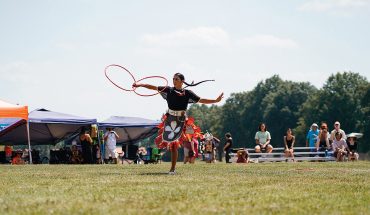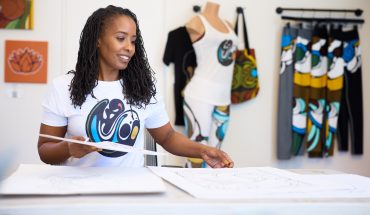
Finding strength when he needs it most in the act of giving
by Settle Monroe
photograph by Jillian Clark
In 2015, on a rural farm just outside the African fishing port of Cape Coast, Ghana, a farmer heard a loud ruckus coming from a pack of his pigs. When he arrived at the scene of the commotion, he found the unthinkable – the head of a little girl poking out of the dirt. She had been buried alive and was hanging on for every inch of her life. The girl, who doctors estimated was between two and three years old, was immediately taken to a hospital before being discharged to a nearby orphanage. There she was given her name: Angel.
The directors of the orphanage soon realized they did not have the resources to serve the physical and mental challenges of Angel Komenda’s cerebral palsy. Without any family or resources of her own, Angel was returned to the only place that would take her, the Cape Coast Teaching Hospital. It was here that she met a Lins Barwick, a young pre-medical student from Raleigh. Barwick would soon become much more than a medical minder for Angel. He would become a friend and advocate.
A student at Wake Forest University, Barwick moved to Ghana in January 2016 to spend the second semester of his sophomore year studying medicine. Just as importantly, he wanted to expand his worldview and to experience a culture different from the comfortable and safe community he knew and loved in Raleigh. He spent months researching internships before eventually settling on World Unite, an international organization that matches students’ travel and volunteer interests with opportunities abroad.
When Barwick arrived at Cape Coast Teaching Hospital, he did not know a soul or even anyone who had gone before him, but he hit the ground running. He juggled early morning rounds, rotations between wards, and helping patients with trauma and wound dressings.
He also experienced how medical care in a developing country like Ghana functions with overwhelming needs and extremely limited resources. Doctors are forced to make difficult decisions about patient care based on priority needs and available space. They must also combat ancient, African beliefs still held in certain circles that illnesses and disabilities may be the result of curses from the devil. Barwick saw firsthand how people who suffer from illness and disability in Ghana can also become outcasts who are stigmatized because of these beliefs. In Angel’s case, doctors believe that her parents, upon realizing her disabilities, buried her as a sacrifice to the devil so they might be spared the effects of a curse.
When Barwick began his rotation on the pediatric ward of the teaching hospital, he knew he had found his sweet spot. It was there that he got to know the little girl who would quickly steal his heart. “Angel was a patient, but she was also just living in the pediatric ward. When I got there, she’d already been there for five months. She really didn’t have anywhere to go.” Barwick saw more than her disabilities. He saw a unique, joyful little girl with a twinkle in her eyes. He also recognized her need for specialized therapy, intervention, and a long-term plan.
Angel’s angel
Barwick got to work. He met with the director of social welfare of the hospital to create a plan to transition Angel out of the hospital. He contacted nearby orphanages and arranged meetings with her doctors. He and a friend made sure she received the daily treatment and therapy that she needed. He bought her hearing aids.
Thick red tape and frustrating administrative power struggles presented themselves at every opportunity. “When people didn’t return my phone calls,” Barwick says, “I just kept calling. When I was told that the orphanage couldn’t handle her needs, I made sure that I was doing everything I could to help her improve.” His hard work eventually paid off when he received the news that a nearby orphanage, the Hope Center, had approved Angel’s admission. Barwick was thrilled when he toured the facility. “The orphanage and the people were so nice. They even have a washing machine! I didn’t see a washing machine my entire time in Africa. It is also a primary school and a church.” However, the directors of the Hope Center made clear to Barwick that Angel could not stay there indefinitely. “They told me plainly that this is just a short-term solution.”

Lins Barwick with Angel at Cape Coast Teaching Hospital in Ghana.
But finding a safe, stable place for Angel to live, where she could receive her therapy, was what Barwick wanted to accomplish before he returned to Wake Forest University for summer school with some sense of peace.
Unfortunately, Barwick’s peace was dramatically interrupted just weeks after returning from Africa. On June 11, at about 2 a.m., Barwick was walking to his apartment in Winston-Salem when a car approached him. A man opened the back door and asked for Barwick’s wallet. Barwick had his wallet in hand, ready to give it to him, when the man shot him in the chest and sped off, leaving Barwick facedown and bleeding in the road. After 10 days in the hospital and two major surgeries to repair his abdomen and spine, Barwick returned home to Raleigh where he was greeted by an onslaught of family and friends. Apart from nerve pain in his leg and decreased stamina, Barwick says he now feels pretty good. Although he will likely deal with residual effects from the shooting for the next year, his attitude remains positive. “The support has been incredible,” he says. “I have no words to explain how thankful I am for my friends and family.”
They were also there for Angel. Knowing how important Barwick’s dedication was to the young girl, his friends and family raised over $15,000 to support her ongoing health needs as he recovered. Barwick attributes much of his recovery and positive prognosis to his determination to help Angel. “Angel has been a beacon for me during the recovery process. Helping her has given me a sense of purpose and drive.”
Ultimately, Barwick hopes a family will adopt Angel and give her the love, attention, and therapy that she deserves. Finding this family is his next mission.
“There is no telling what she could do with specialized therapy and services,” he says. “She could talk and walk. She has so much promise.” His enthusiasm grows as he explains why people in Raleigh should care about a young, orphaned girl in Africa. “My parents raised me to show respect to all people. It was ingrained in me as a young child.”
Barwick says nothing else is as important. “If everyone would take a small step to help another person, the ripple effect could literally change the world. I truly believe that.”



